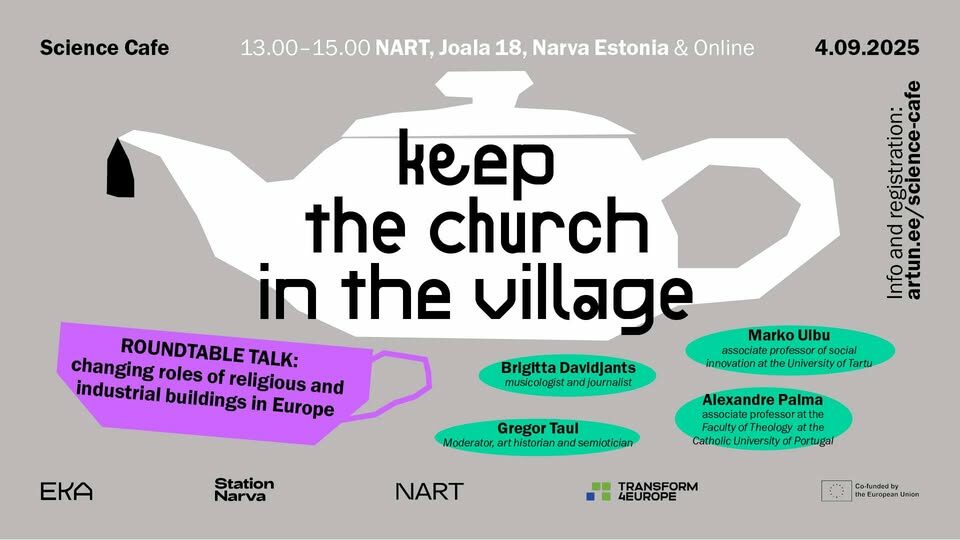
Estonian Academy of Arts Science Cafe is hosting a roundtable talk on the changing roles of religious and industrial buildings in contemporary Europe on the 4th of September from 1 to 3 pm at the Narva Art Residency (NART, Joala 18) as part of the Station Narva festival. The event will be held both onsite and online.
Estonian Academy of Arts Science Cafe focuses on the shifting roles of religious and industrial buildings in contemporary Europe. As congregations shrink and industries relocate, churches and factories alike are increasingly left vacant, raising complex questions about reuse, heritage, and identity. The discussion will address how these spaces are being reimagined—as museums, cultural centres, or residential developments—and what this reveals about broader societal transformations in both secular and post-industrial contexts.
The discussion will feature musicologist and journalist Brigitta Davidjants, associate professor of social innovation at the University of Tartu Marko Uibu, associate professor at the Faculty of Theology at the Catholic University of Portugal and Auxiliary Bishop of the Patriarchate of Lisbon Alexandre Palma. The talk will be moderated by art historian and semiotician Gregor Taul. The event will take place under the auspices of the Transform4Europe project – a collaborative network of 11 European universities focusing on climate change, digitalisation, and social challenges.
The event requires pre-registration by August 29.
A free bus service is provided from Tallinn to Narva and back, departing from EKA. More information is available upon pre-registration.
Facebook event.
The English saying “keep the church in the village” means “do not cause an uproar.” There are similar sayings in German, French and many other European languages. With some differences, they denote that the church forms the centre of community, the basis of identity, but also, in a figurative sense, the embodiment of common sense. Despite the geographical scope and cultural differences in Catholic, Orthodox and Lutheran countries this has been the case in all of Europe. However, recent times have brought changes. Industrialisation, secular modernisation and large-scale urban planning schemes have shifted the principles of how communities are formed. This was especially so in the fundamentally atheist Soviet Union. For example in Soviet Estonia only a few religious edifices were erected between 1944 and 1991.
The number of church-goers has also declined. As a result some churches have lost their congregations. This has raised the question of how to treat the disused churches? The situation resembles that of the post-industrial shift. Starting from the 1970s European manufacturers have left the continent in search of cheaper labour and thus the abandoned factories have made way for the birth of ‘creative cities’ – we have seen empty factories first used as squats and informal project spaces, then as gentrified creative quarters and eventually becoming expensive lofts. As for the repurposed religious buildings there are more thought-provoking examples where former religious buildings have been turned into museums, bookshops, concert halls or even swimming pools. As adaptive reuse of spaces and materials is becoming a legislative requirement in Europe, we will see more such examples in the near future.
At the backdrop of a contemporary music festival, Narva’s fabled industrial legacy and the crossroads of divergent (religious) identities this roundtable will look at both historic case studies and current disputes concerning religious and industrial heritage in Europe.
*
Brigitta Davidjants is a journalist and researcher at Estonian Academy of Music and Theatre, Estonia. In her academic research, she looks at national identity constructions and the marginalities of subcultures.
Marko Uibu is an Estonian social scientist and Associate Professor of Social Innovation at the Institute of Social Studies, University of Tartu. His 2016 doctoral dissertation in University of Tartu was called “Religiosity as Cultural Toolbox: a Study of Estonian New Spirituality”.
Alexandre Palma is a theologian, priest and university professor. He is an assistant professor at the Catholic University (courses: Mystery of God; Christology; and Theology of Religions) and a researcher at the CITER – Research Center for Theology and Religion Studies. He is also a member of the European Society for Catholic Theology and of the Seminar of young scientists of the Lisbon Academy of Sciences.
Gregor Taul is a teacher, critic, and curator based in Tallinn, working as an associate professor in the Departments of Interior Architecture and General Theory Classes at the Estonian Academy of Arts. In his academic research, he focuses on art in public space, with a particular interest in Soviet-era monuments and murals as well as contemporary public art commissions.